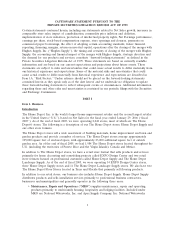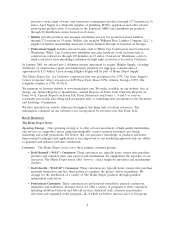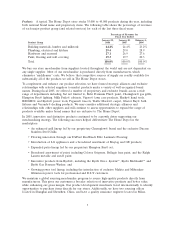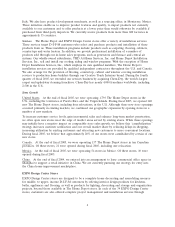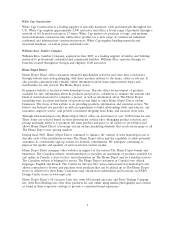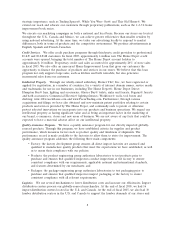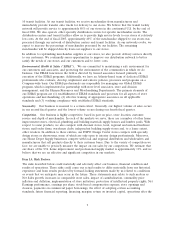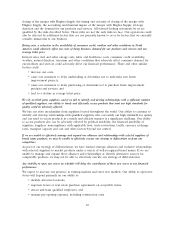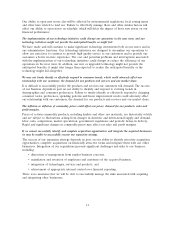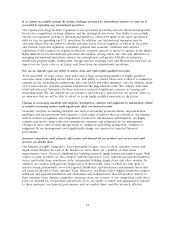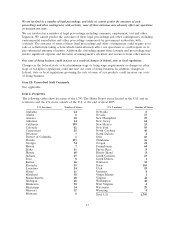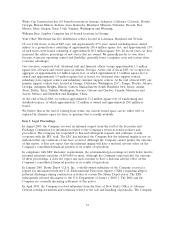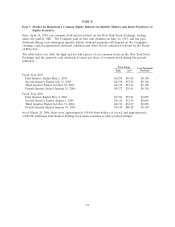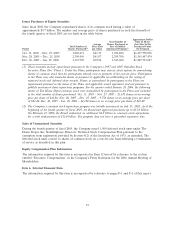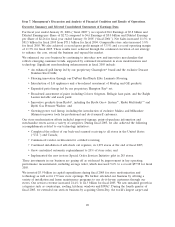Home Depot 2005 Annual Report Download - page 22
Download and view the complete annual report
Please find page 22 of the 2005 Home Depot annual report below. You can navigate through the pages in the report by either clicking on the pages listed below, or by using the keyword search tool below to find specific information within the annual report.closing of the merger with Hughes Supply, the timing and certainty of closing of the merger with
Hughes Supply, the accounting and financial impact of the merger with Hughes Supply, strategic
direction and the demand for our products and services. All forward-looking statements by us are
qualified by the risks described below. These risks are not the only risks we face. Our operations could
also be affected by additional factors that are not presently known to us or by factors that we currently
consider immaterial to our business.
Rising costs, a reduction in the availability of consumer credit, weather and other conditions in North
America could adversely affect our costs of doing business, demand for our products and services and our
average ticket price.
Interest rates, fuel and other energy costs, labor and healthcare costs, consumer credit availability,
weather, natural disasters, terrorism and other conditions that adversely affect consumer demand for
our products and services could adversely affect our financial performance. These and other similar
factors could:
• increase our costs,
• cause our customers to delay undertaking or determine not to undertake new home
improvement projects,
• cause our customers to delay purchasing or determine not to purchase home improvement
products and services, and
• lead to a decline in average ticket price.
We rely on third party suppliers, and if we fail to identify and develop relationships with a sufficient number
of qualified suppliers, our ability to timely and efficiently access products that meet our high standards for
quality could be adversely affected.
We buy our store merchandise from suppliers located throughout the world. Our ability to continue to
identify and develop relationships with qualified suppliers who can satisfy our high standards for quality
and our need to access products in a timely and efficient manner is a significant challenge. Our ability
to access products also can be adversely affected by political instability, the financial instability of
suppliers, suppliers’ noncompliance with applicable laws, trade restrictions, tariffs, currency exchange
rates, transport capacity and cost and other factors beyond our control.
If we are unable to effectively manage and expand our alliances and relationships with selected suppliers of
brand name products, we may be unable to effectively execute our strategy to differentiate us from our
competitors.
As part of our strategy of differentiation, we have formed strategic alliances and exclusive relationships
with selected suppliers to market products under a variety of well-recognized brand names. If we are
unable to manage and expand these alliances and relationships or identify alternative sources for
comparable products, we may not be able to effectively execute our strategy of differentiation.
Any inability to open new stores on schedule will delay the contribution of these new stores to our financial
performance.
We expect to increase our presence in existing markets and enter new markets. Our ability to open new
stores will depend primarily on our ability to:
• identify attractive locations,
• negotiate leases or real estate purchase agreements on acceptable terms,
• attract and train qualified employees, and
• manage pre-opening expenses, including construction costs.
10



